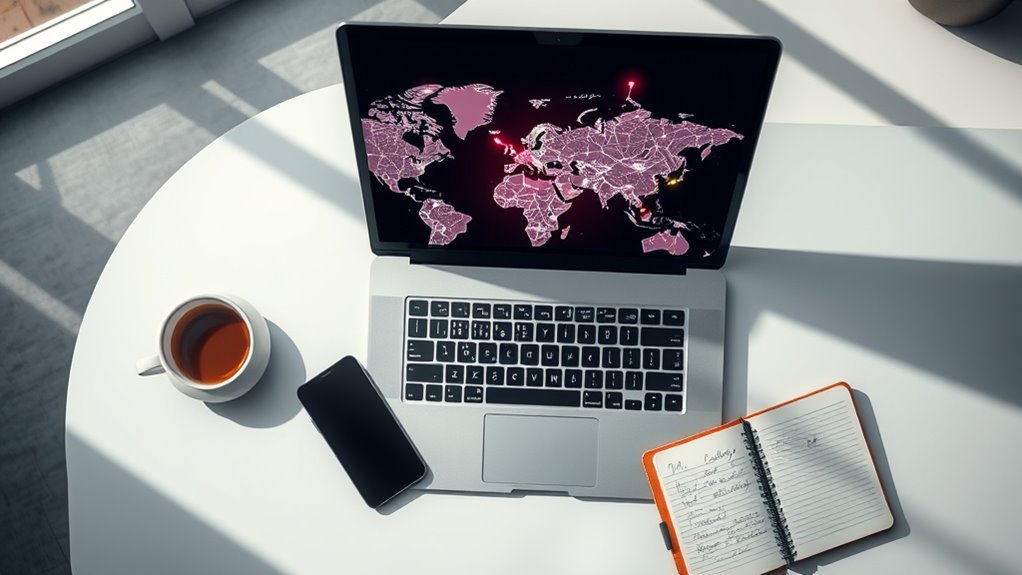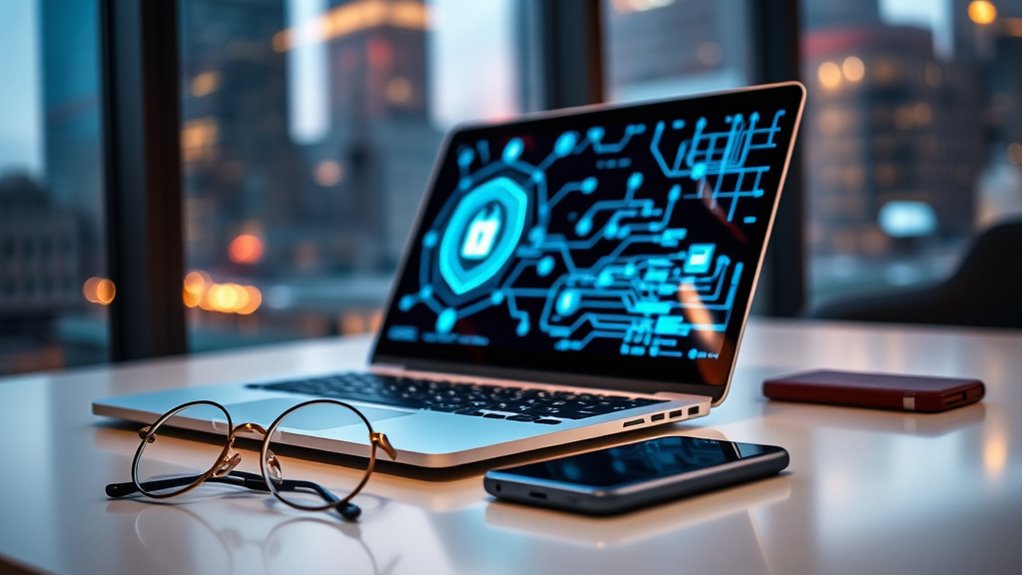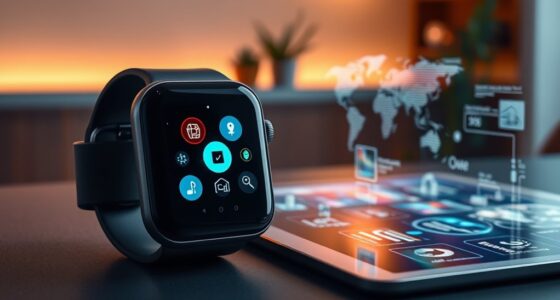A VPN (Virtual Private Network) creates a secure, encrypted link between your device and the internet, helping protect your privacy and data. Use one when you’re on public Wi-Fi to prevent hackers from accessing your personal information, or when you want to access content blocked in your region. A VPN also masks your IP address for online anonymity. Want to learn more about how it keeps you safe and boosts your browsing? Keep exploring for insights.
Key Takeaways
- A VPN creates a secure, encrypted connection between your device and the internet, protecting your data and privacy.
- Use a VPN on public Wi-Fi to safeguard personal information from cybercriminals and prevent unauthorized access.
- A VPN helps bypass geo-restrictions, allowing access to region-locked content and websites.
- When handling sensitive information like banking or work emails, a VPN provides an added layer of security.
- Choose to use a VPN when you want online anonymity, privacy, or to access content restricted in your location.

Have you ever wondered how to protect your online privacy or access content securely from anywhere? That’s where a VPN, or Virtual Private Network, comes into play. A VPN creates a secure, encrypted connection between your device and the internet, which is essential for maintaining encryption security and safeguarding your data privacy. When you connect to a VPN, your internet traffic is routed through a remote server operated by the VPN provider. This process masks your IP address and encrypts all data transmitted, making it much harder for anyone—hackers, advertisers, or even your internet service provider—to monitor or intercept your online activities.
Using a VPN is especially significant when you’re on public Wi-Fi networks. These networks are often unsecured, leaving your personal information vulnerable to cybercriminals who might be lurking on the same network. By activating your VPN, you add a layer of protection, ensuring that your data is encrypted and that your online presence remains private. This is particularly essential if you’re handling sensitive information, such as banking details, work emails, or personal messages. A VPN also helps prevent tracking by government agencies or advertisers who often collect data based on your browsing behavior, thereby reinforcing your data privacy.
Using a VPN on public Wi-Fi protects your data and maintains your privacy from cybercriminals and trackers.
Another key benefit of a VPN is its ability to bypass geographical restrictions. Many streaming services, websites, and online platforms impose regional limitations, preventing you from accessing content available in other countries. When you connect to a VPN server in a different location, it appears as if you’re browsing from that country. This feature is handy for watching shows or accessing services that might be blocked in your area. However, keep in mind that some platforms actively detect and block VPN traffic, so it’s essential to choose a reliable VPN provider with servers optimized for streaming. Additionally, understanding the importance of projector contrast ratios can help you create a better home cinema setup if you’re also interested in entertainment technology.
While VPNs are powerful tools for online security and privacy, they’re not a one-stop solution. You should also practice good cybersecurity habits, like updating your software regularly and using strong, unique passwords. Remember, a VPN encrypts your data in transit but doesn’t protect you from malware or phishing attacks if you click on malicious links or download unsafe files.
Frequently Asked Questions
Can a VPN Improve My Internet Speed?
A VPN generally doesn’t improve your internet speed; in fact, it can sometimes slow it down because of the encryption process and rerouted traffic. However, if your ISP throttles certain services or you’re on a congested network, a VPN might help improve your VPN performance by bypassing restrictions. Keep in mind, the impact on internet speed varies based on the VPN provider’s quality and server location.
Is Using a VPN Legal in All Countries?
Using a VPN isn’t legal everywhere, and ignoring legal restrictions can land you in serious trouble. Countries have strict laws regarding VPN use, often tied to data sovereignty and national security concerns. In some places, VPNs are banned outright, while others regulate them heavily. You must check local laws before using one, because what’s legal in your country might be illegal and punishable in another, risking hefty fines or worse.
How Does a VPN Protect My Online Privacy?
A VPN safeguards your online privacy by encrypting your data with strong protocols, making it unreadable to outsiders. It also guarantees data anonymity by masking your IP address, so your real location stays hidden. When you browse, stream, or shop online, a VPN keeps your activities private and secure from hackers, ISPs, and even government surveillance. This way, you maintain greater control over your personal information and online footprint.
Will a VPN Work on All Devices?
You can use a VPN on most devices, like smartphones, laptops, and tablets. For example, a traveler using a laptop and smartphone in a foreign country can install a VPN on both to secure their connection. Device compatibility varies, so you should check whether your device supports VPN installation. Most mainstream operating systems like Windows, macOS, Android, and iOS do support VPNs, making it easy to protect all your devices.
Can a VPN Bypass Government Restrictions?
A VPN can often bypass government censorship by masking your IP address and encrypting your internet traffic, helping you access restricted content and enhance your internet freedom. However, its effectiveness depends on the level of restrictions and the VPN’s ability to evade detection. While many users find VPNs useful for overcoming government censorship, some regimes actively block or restrict VPN use, so results may vary depending on your location.
Conclusion
Now that you know what a VPN is and when to use one, you might wonder if it’s worth the effort. Protecting your privacy and securing your data sounds essential, right? Using a VPN can give you peace of mind whether you’re browsing at home, on public Wi-Fi, or traveling abroad. So, isn’t it time you took control of your online security? Don’t wait until it’s too late—start using a VPN today and browse confidently.









